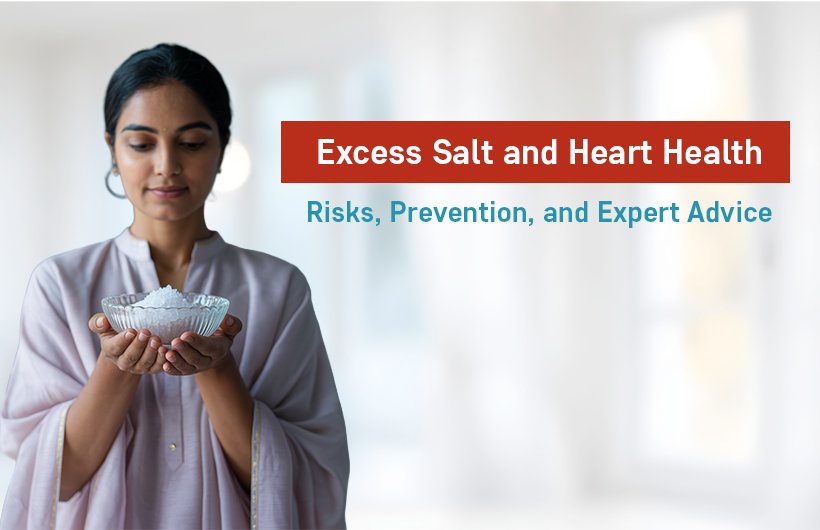For anyone concerned about cardiovascular health, understanding the link between excess salt and heart health is essential. Too much salt in your diet can silently increase blood pressure, strain your heart, and even raise the risk of heart disease. In Ahmedabad, where urban diets often include processed and high-sodium foods, staying aware of salt intake is more critical than ever.
At Aarogya Heart Care & Dental Clinic, Dr. Jignesh Patel, a Cardiologist in Ahmedabad, educates patients about the risks of high sodium consumption and offers personalized guidance to maintain optimal heart health. With expert advice and lifestyle tips, protecting your heart becomes achievable, even in a fast-paced city environment.
What is Salt and Its Role in the Body?
Salt, primarily composed of sodium and chloride, is essential for regulating fluid balance, nerve signals, and muscle function. While a moderate amount is necessary, excess sodium can disrupt this delicate balance and harm your cardiovascular system.
Sodium vs. Salt
- Sodium: The mineral responsible for most heart-related risks
- Salt: A compound consisting of sodium and chloride
- Overconsumption of sodium is the main concern for heart health
Essential Functions of Sodium
- Maintains blood pressure
- Supports nerve function
- Aids muscle contraction
Recommended Daily Salt Intake
The World Health Organization advises limiting salt to under 5 grams per day. However, the average Indian consumes nearly double that amount, increasing the likelihood of hypertension and heart disease.
How Excess Salt Affects Your Heart
High Blood Pressure (Hypertension)
Sodium draws water into the bloodstream, increasing blood volume and pressure. Persistent hypertension can damage arteries and overwork the heart.
Arterial Stiffness
High salt intake reduces arterial flexibility, forcing the heart to pump harder and elevating cardiovascular risk.
Fluid Retention
Excess salt causes water retention, swelling, and puts additional strain on the heart, potentially leading to heart failure.
Salt and Heart Disease: The Connection
Coronary Artery Disease
High sodium levels accelerate plaque formation in arteries, restricting blood flow and increasing the risk of heart attacks.
Heart Failure Risk
Persistent high blood pressure weakens heart muscles, raising the risk of congestive heart failure.
Stroke Risk
Elevated blood pressure from high salt intake also increases the likelihood of stroke due to vessel damage.
Symptoms of High Salt Intake on Heart Health
- Headaches
- Swelling in hands, feet, or ankles
- Fatigue and shortness of breath
- Irregular heartbeat
Populations Most at Risk
- Older Adults: Age-related blood vessel changes increase sensitivity to salt
- Existing Heart Patients: Sodium further strains compromised hearts
- Genetic Predisposition: Family history heightens risk
Common Sources of Hidden Salt
- Processed and packaged foods
- Fast food and restaurant meals
- Sauces, pickles, and condiments
How to Monitor Your Salt Intake
- Read nutrition labels carefully
- Measure the salt added during cooking
- Use alternatives like herbs, spices, and lemon
Preventive Measures and Regular Checkups
Routine checkups with a heart specialist doctor in Ahmedabad help detect early signs of hypertension and heart disease. Blood pressure monitoring, cholesterol checks, and lifestyle counseling are essential for long-term heart health.
Conclusion
The link between excess salt and heart health is clear—too much sodium strains the heart, raises blood pressure, and increases the risk of heart disease. From raising blood pressure to increasing the risk of heart disease and stroke, its effects are widespread. At Aarogya Heart Care & Dental Clinic, Dr. Jignesh Patel emphasizes the importance of monitoring your salt intake and adopting a heart-healthy lifestyle. With expert guidance and regular checkups, patients can take proactive steps to protect their cardiovascular health and prevent complications.
By making small but consistent lifestyle changes—such as reducing sodium in your diet, exercising regularly, and following professional advice from Dr. Jignesh Patel at Aarogya Heart Care & Dental Clinic—you can significantly lower your risk of heart problems. Remember, safeguarding your heart today ensures a healthier, more energetic life tomorrow.






